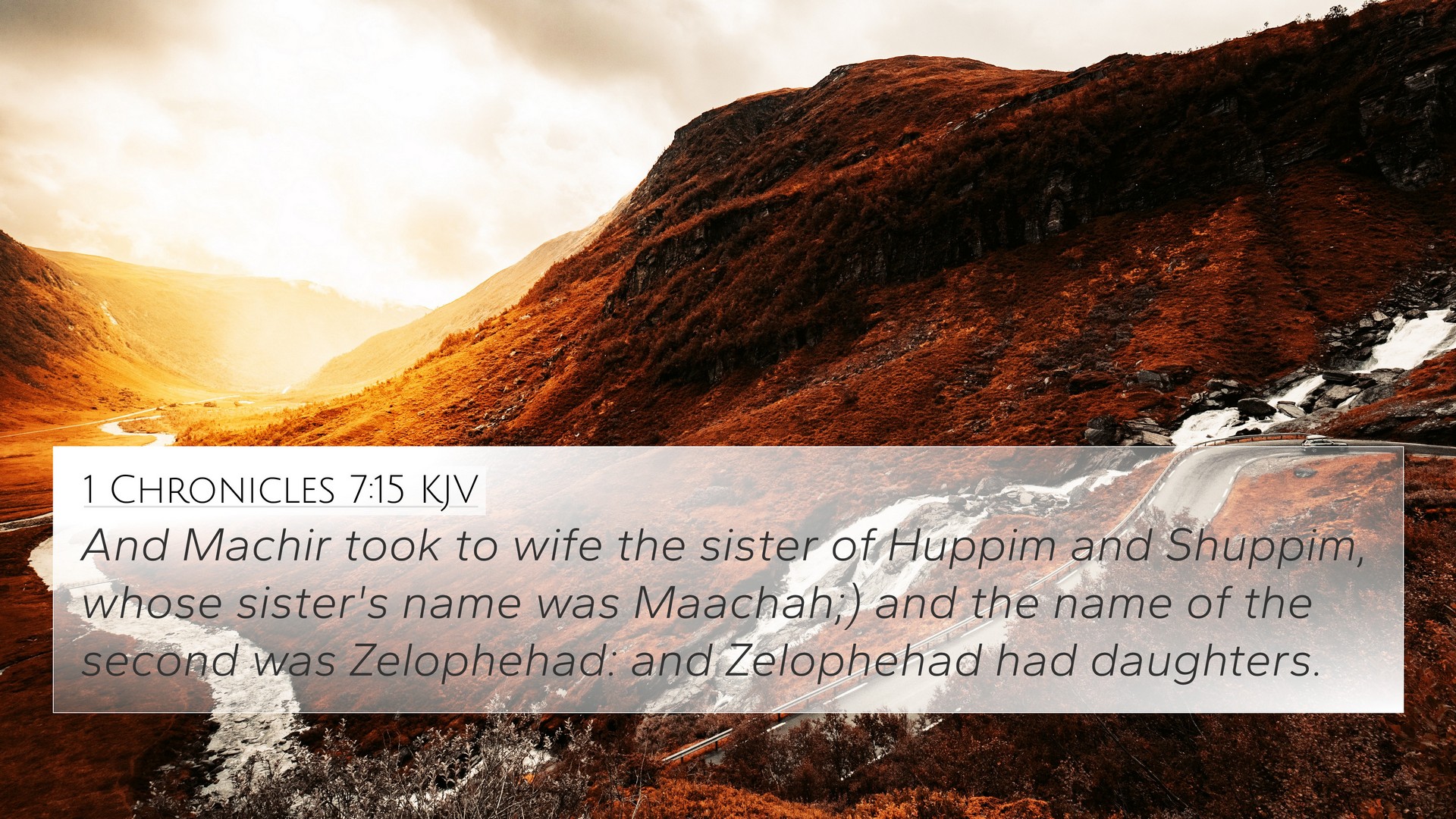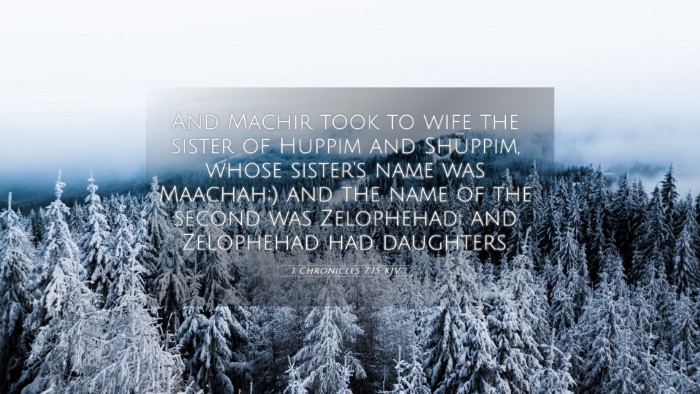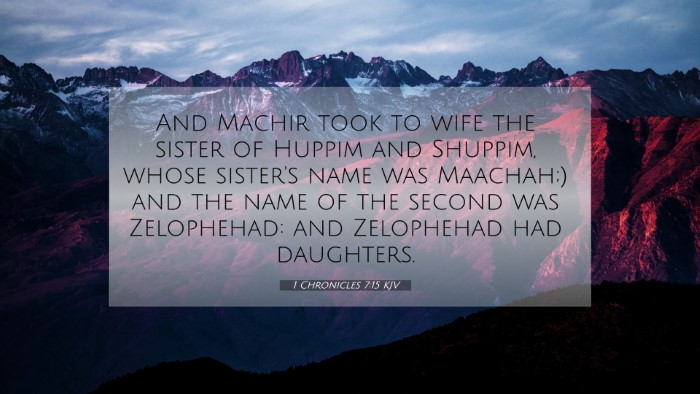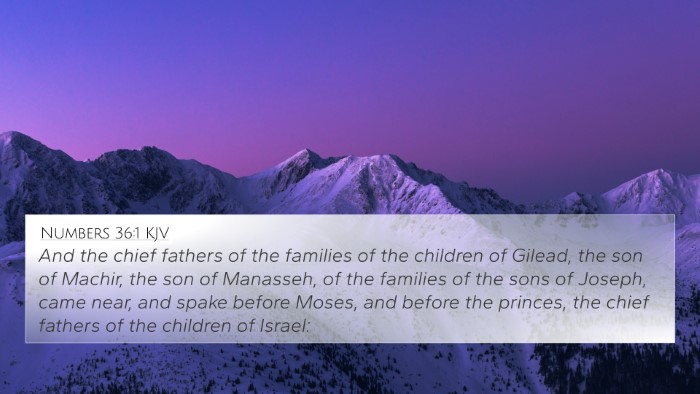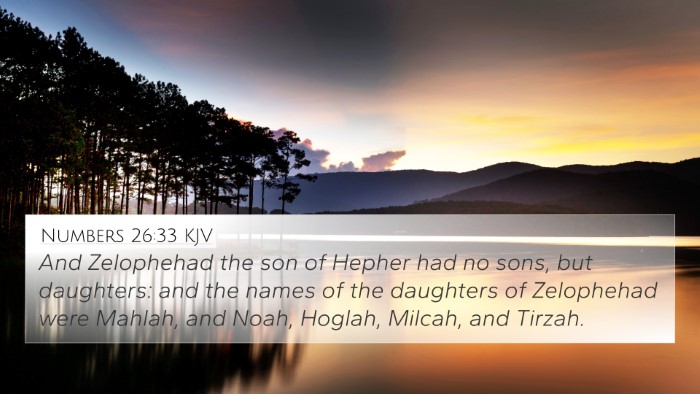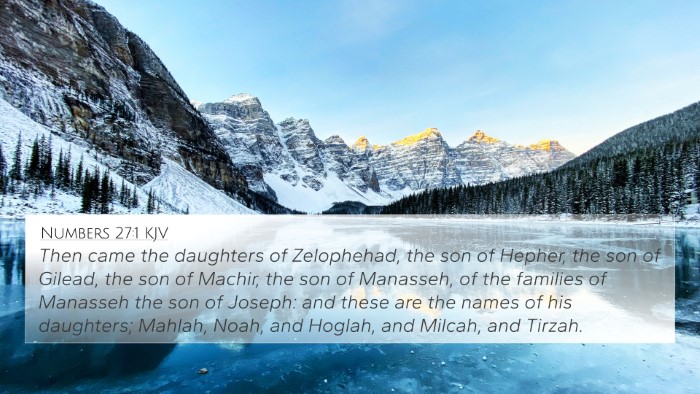Understanding 1 Chronicles 7:15
1 Chronicles 7:15 states: "And the sons of Makhir the son of Manasseh were Gilead: and Gilead took him wives of the daughters of Hupper; and the name of the one was Maachah." This verse is significant within the genealogy of the tribes of Israel, particularly focusing on the lineage of Manasseh.
Summary and Interpretation
The genealogy presented in 1 Chronicles serves to establish the heritage and lineage of the Israelites. In this specific verse, we see the name Makhir, who is notable as the firstborn son of Manasseh. His prominence is further emphasized through his sons, particularly Gilead, establishing a distinct family line within the larger tribe.
-
Matthew Henry's Commentary: Henry discusses the importance of genealogy in the Bible, noting that it reflects God's faithfulness to His covenants and His people. In this case, Makhir and Gilead signify God’s promise fulfilled in establishing a prosperous lineage.
-
Albert Barnes' Notes: Barnes emphasizes the inclusion of women in genealogies, often overlooked in biblical texts. By naming Maachah, the wife of Gilead, this verse illustrates the importance of family ties and women's roles in lineage, something that reflects a rich cultural heritage.
-
Adam Clarke's Commentary: Clarke provides insights into the geographical context, indicating that Gilead is associated with territories east of the Jordan River. This adds a layer of understanding to how these family lines influenced Israel's history and settlements.
Cross-References and Thematic Connections
This verse connects with several other biblical passages, providing a broader context for understanding the role of Makhir and Gilead within the Israelite genealogy. Below are some significant cross-references:
- Numbers 26:29-30: This passage describes the descendants of Manasseh, emphasizing the importance of Makhir in the context of tribal division.
- Joshua 17:1-2: Here, the inheritance of the tribe of Manasseh is discussed, showcasing the generational progression from Makhir to Gilead.
- Exodus 6:20: This passage gives insight into the lineage of Levi and how it relates to Manasseh, enriching our understanding of Israel's family trees.
- Genesis 48:14-16: Jacob's blessings clarify the significance of Ephraim and Manasseh and set the stage for Makhir's lineage.
- 1 Chronicles 5:23: This passage reflects on the expansion of the tribe of Manasseh, linking back to Gilead’s descendants.
- 1 Chronicles 7:14: Directly before our main verse, this verse details the family of Manasseh, leading into the mention of Makhir.
- Deuteronomy 3:15: It provides historical context about Gilead's territories and establishes the geographical significance of this family line.
- Joshua 13:31: This passage delineates portions of the land belonging to the descendants of Gilead, directly connected to our verse's context.
- Luke 3:33: A New Testament reference that leads back to the lineage of Christ and shows how Old Testament genealogies are relevant to New Testament understandings.
- Revelation 7:6: Discusses the tribes of Israel, linking back to these genealogical roots, emphasizing the fulfillment of God’s plan through these lineages.
Tools and Methods for Cross-Referencing
Understanding cross-references in the Bible can be greatly enhanced by using the following tools:
- Bible Concordance: Helps locate verses and themes throughout scripture efficiently.
- Cross-Reference Bible Study: Provides techniques for identifying significant connections between verses.
- Bible Reference Resources: Such as study Bibles that include marginal annotations for cross-references.
- Comprehensive Bible Cross-Reference Materials: Books and online tools designed to support in-depth analysis of scriptures.
- How to Use Bible Cross-References: Guides available to teach beginners about thematic connections between different verses.
Conclusion
In conclusion, 1 Chronicles 7:15 is a vital part of the biblical genealogy that illustrates the significance of family lines in the history of Israel. The connections drawn through cross-referencing other verses provide valuable context and deepen our understanding of scriptural themes. By exploring these inter-Biblical dialogues, readers can gain a more nuanced comprehension of the overarching narrative of the Scriptures.
